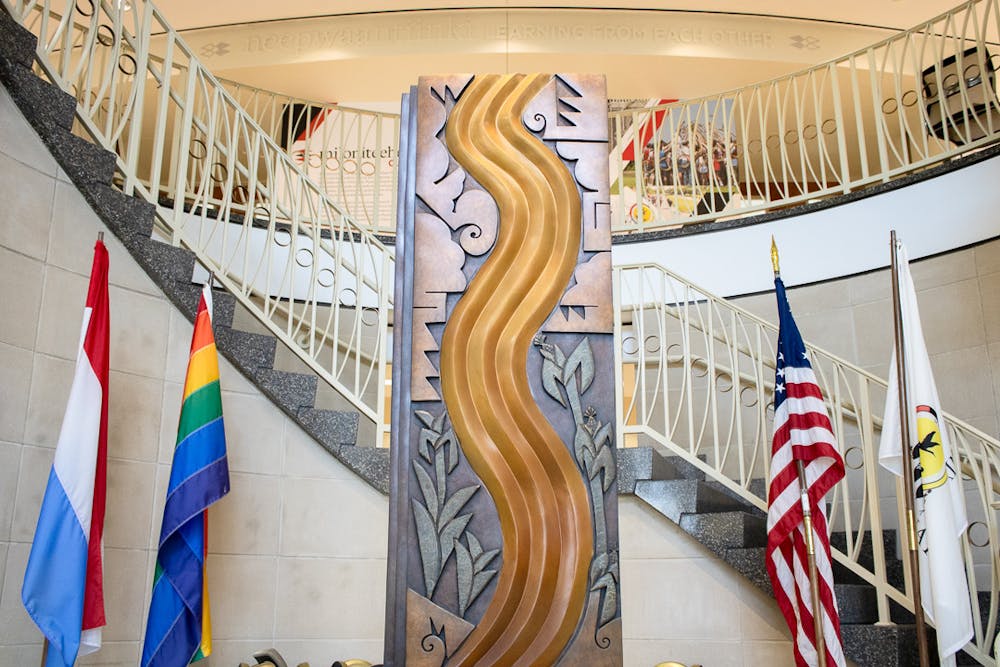Within the last two weeks of January, President Donald Trump signed three executive orders mandating the elimination of diversity, equity and inclusion programs (DEI) throughout the federal government and armed forces.
The second order states that the Attorney General and the Secretary of Education will offer guidance to institutions of higher education regarding measures to comply with Students for Fair Admissions, Inc. v. President and Fellows of Harvard College.
On Feb, 11, Ohio Senate Bill 1 passed in the Ohio Senate in a 21-11 vote, but it hasn't been passed in the House. S.B. 1 would ban diversity and inclusion efforts, prevent faculty from striking, set rules around politically-controversial classroom discussions and put diversity scholarships at risk, among other things, according to Ohio Capital Journal.
Pepper Stetler, a professor of history of art and architecture at Miami University, wrote a testimony as a private citizen to the Senate Higher Education Committee in opposition to S.B.1.
“S.B.1 is the epitome of big government overreach,” Stetler wrote. “This bill would impose unprecedented levels of political interference and unnecessary micromanagement on Ohio's colleges and universities. They would severely undermine the integrity of our higher education system.”
More than 800 people submitted testimony.
“Miami University is monitoring proposed state legislation and new federal requirements and is not intending to comment at this time,” wrote Seth Bauguess, the senior director of communications at Miami, to The Miami Student.
Between both sides of these decisions, there’s a battle of interpretations taking place, including one that requires us to reiterate old definitions, reinterpret our own meanings and rediscuss the value of DEI.
For some people at Miami, DEI is defined by their experiences.
Diversity
Juan Carlos Albarrán is a professor in the Department of Global and Intercultural Studies and a member of the Association of Latinx Faculty and Staff. His field of study focuses on Caribbean and Latin America Studies.
Albarrán grew up in Havana, Cuba, and moved to the United States in 1999 where he studied at Northern Arizona University for his undergraduate degree and attended graduate school at the University of Arizona.
Enjoy what you're reading?
Signup for our newsletter
“I’m an immigrant who came to this country, who had the opportunity to go through college, to go through grad school, [to] get jobs and to see the opportunities that a diverse environment can provide for someone like me and that I can provide for others too,” Albarrán said. “I think that is an enriching experience.”
Albarrán said he values the perspective gained from being exposed to new cultures. While at Miami, he’s taken part in several multicultural programs and initiatives, including the Latin American and Caribbean UniDiversity Festival.
“I have worked through certain programs, initiatives, [including] taking students abroad to other countries or bringing international students here and creating an environment where learning and building knowledge for all, at different stages, is important,” Albarrán said.
Equity
Rodney Coates, a public sociologist and professor in the Department of Global and Intercultural Studies at Miami, teaches courses in critical race and ethnic studies, conducted bias training with police and other organizations and helped establish pathways to progress for underrepresented students.
In 2022, he was awarded the Mid-American Conference Outstanding Faculty Award for Student Success for his extensive work in helping students to succeed academically.
Coates said he disagrees with the administration’s claim that organizations are prioritizing diversity over merit because of DEI initiatives.
“Now there’s this notion that, somehow, some individuals are getting special treatment. I’ve never seen that,” Coates said. “I’m a graduate of the University of Chicago. I came out of the ghetto – I never got a scholarship. That means I worked my way through college.”
Coates said he believes in striving for excellence and that it’s paramount to every student’s success.
“We have one basic mission at Miami, and that is the education of all of our students,” Coates said. “That means meeting the students where they are and lifting them up to this high standard.”
Inclusion
Jackson Harper is a junior studying English language arts for secondary education as well as linguistics. He’s the president of the Black Student Action Association and a member of My Campus Brothers.
Harper values being a part of these organizations – he said they give him the opportunity to build stronger relationships within his community and to embrace a part of his identity that he hasn’t always felt welcome to.
“It’s always been really cool to have DEI spaces because it feels like I can actually be in a room without eyes going on me,” Harper said. “It feels nice to not be looked at like some type of an other. I like to live without the label, I like to feel like my skin and who I am is normal.”
However, Harper doesn’t just appreciate having a dedicated community but having one that contributes to a greater whole.
“When you have the full story, it’s very interesting how we can start moving away from mistakes, we can start evolving as a group, we can start learning more things because DEI is not just a little check-box we have,” Harper said. “DEI is actually looking at the whole picture when you’ve been given a snapshot edited photo for years, upon years, upon years.”
Between Harper, Coates and Albarrán, a common thread can be found between their respective outlooks: an understanding that diversity can only thrive when those who champion it make themselves seen and heard.
“The students have more power than we, the faculty, have,” Albarrán said. “The students are also members of their community, they have congressmen, they have senators, they have the voice to channel how they feel about what is happening and how that is impacting them in their spaces.”
Coates speaks to how students should wield that voice.
“We take love and honor to where we recognize that we’re all a part of this community called Miami community,” Coates said. “And either we stand together or we’re going to fall apart.”
Harper echoed the power in numbers Coates described.
“I want people to stand on business and say it with their chest,” Harper said. “I want them to say what needs to be said and not move when the ground starts shaking. When we start doing that as a community, it’s very interesting how our voice gets a lot louder.”




